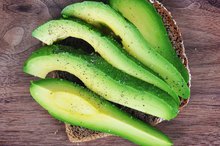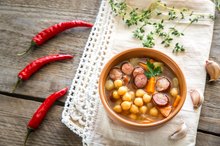How Does Eating Cherries Affect Warfarin?
Warfarin is a drug that is often prescribed to prevent blood clotting. While you are taking warfarin, you may need to change your intake of different foods based on the amount of vitamin K that they contain. Cherries contain some vitamin K but are unlikely to affect the function of warfarin 1.
Warfarin
Warfarin is an anticoagulant, or blood thinner, which means that it inhibits the ability of your body to form blood clots. Blood clots are how the body limits bleeding, but some blood clots can block blood vessels and result in a serious medical problem known as a pulmonary embolism. Warfarin is designed to prevent blood clots in people who have a tendency to form clots too easily or who are at risk of developing pathological clots.
Warfarin and Vitamin K
Can You Eat Chocolate While Taking Coumadin?
Learn More
Vitamin K is needed for many of the chemical reactions involved in clot formation. Warfarin works by blocking the activity of vitamin K, thus slowing the formation of blood clots 1. As a result, if you are taking warfarin, your ability to form blood clots is very sensitive to your vitamin K levels. If you eat too much vitamin K, you may begin forming aberrant blood clots.
Cherries and Vitamin K
While taking warfarin, your doctor may recommend that you avoid foods that are high in vitamin K, such as:
- spinach
- kale
- collard greens
- other green leafy vegetables
Cherries are low in vitamin K, which means that they are unlikely to have a significant effect on warfarin. However, eating excessive amounts of them could still cause an overload of vitamin K, so avoid consuming massive amounts of cherries and any other fruit or vegetable containing vitamin K while taking warfarin.
Considerations
Vitamin K Foods to Avoid While on Coumadin
Learn More
Your dose of warfarin will be adjusted so that you are less likely to form pathological blood clots but are also not completely unable to form clots. Once you and your doctor have found the right dose for you, it is important that you try to keep your vitamin K intake relatively steady from day to day. This means that as long as you follow the same diet and eat close to the same amount of vitamin K each day, the warfarin should work well.
Related Articles
References
- ClotCare.com; Vitamin K and Warfarin; Marie B. Walker and Henry I. Bussey; January 2008
- Coumadin (warfarin sodium) [package insert]. Princeton, New Jersey: Bristol-Myers Squibb, 20XX.
- Harter K, Levine M, Henderson SO. Anticoagulation drug therapy: a review. West J Emerg Med. 2015;16(1):11-7. DOI: 10.5811/westjem.2014.12.22933
- Patel S, Patel N. Warfarin. In: StatPearls [Internet]. Treasure Island (FL): StatPearls Publishing.
- Tideman PA, Tirimacco R, St John A, Roberts GW. How to manage warfarin therapy. Aust Prescr. 2015;38(2):44-8. DOI: 10.18773/austprescr.2015.016
Writer Bio
Adam Cloe has been published in various scientific journals, including the "Journal of Biochemistry." He is currently a pathology resident at the University of Chicago. Cloe holds a Bachelor of Arts in biochemistry from Boston University, a M.D. from the University of Chicago and a Ph.D. in pathology from the University of Chicago.









